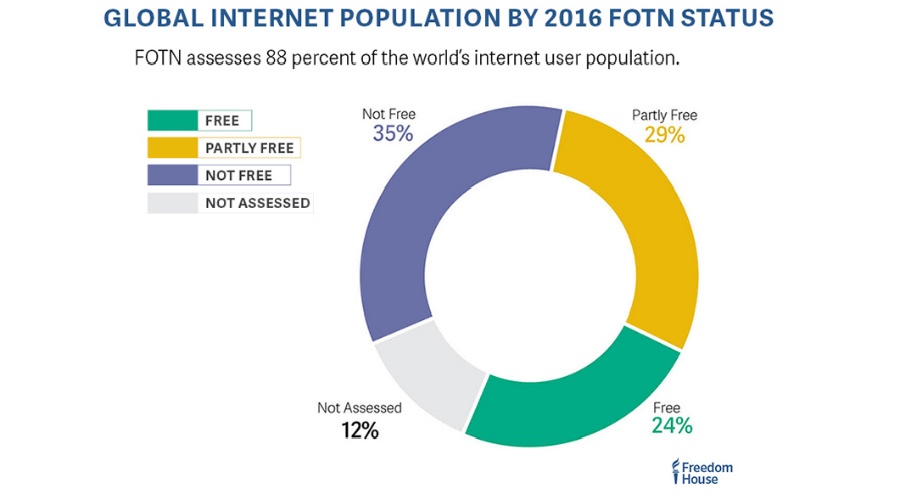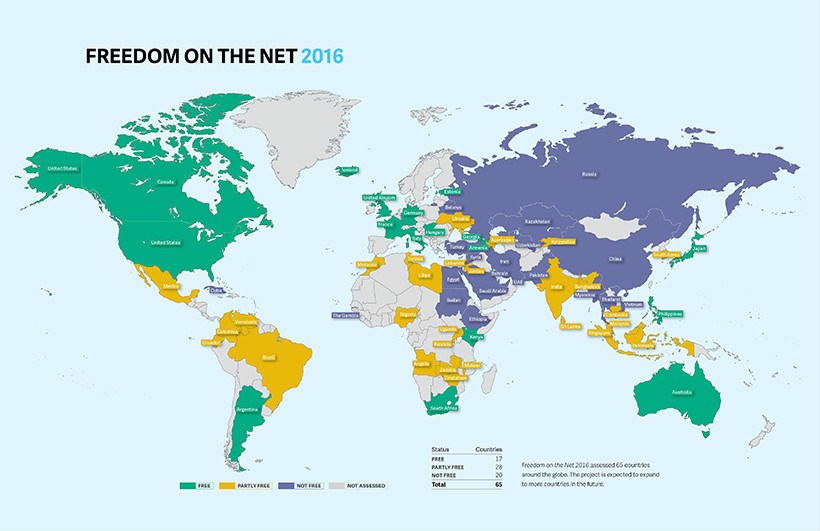I wanted to look at the censorship and internet infiltration and how does it affect the people and what is the role of public library. By looking at the definition of Internet censorship there is a element of control, suppression of people's right by certain authorities by putting restriction on what information is accessible to public. And you cannot also note that there is high censorship in countries oppressed people and those countries all form of control
Internet censorship is the control or suppression of what can be accessed, published, or viewed on the Internet enacted by regulators, or on their own initiative. ... Other areas of censorship include copyrights, defamation, harassment, and obscene material. Support for and opposition to Internet censorship also varies.
https://www.youtube.com/watch?v=LDtSsYGKAp8
Jan 31, 2017 - Uploaded by The Audiopedia
Internet censorship puts restrictions on what information can be publicized or viewed on the Internet. Governments and other organizations commonly use internet censorship to block access to copyrighted information as well as to harmful or sensitive content. However, internet censorship canalso be used as a propaganda method to promote specific religions and political agendas. https://www.iplocation.net/internet-censorship
censorship: What you need to know - BBC News
www.bbc.com/news/.../internet-censorship-what-you-need-to-know
What is censorship for kids?
cen·sor·ship. Use censorship in a sentence. noun. The definition of censorship is the practice of limiting access to information, ideas or books in order to prevent knowledge or freedom of thought. Banning controversial books is an example of censorship.www.yourdictionary.com/censorship
Censorship is the act or practice of suppressing the speech or public communication which is considered objectionable, harmful and sensitive, by a government, media outlet or other controlling bodies. This public content is censored for many reasons that the active bodies believe are immoral.Dec 7, 2012
Reasons for censorship
There is lot of risks for children why need censorship
Censorship on stories
Internet censorship in South Africa
South Africa is not individually classified by the OpenNet Initiative, but is included in ONI's regional overview for sub-Saharan Africa.[1]
Digital media freedom is generally respected in South Africa. Political content is not censored, and neither bloggers nor content creators are targeted for their online activities. In 2013 Freedom House rated South Africa's "Internet Freedom Status" as "Free".[2]
In 2006, the government of South Africa began prohibiting sites hosted in the country from displaying X18 (explicitly sexual) and XXX content (including child pornography and depictions of violent sexual acts); site owners who refuse to comply are punishable under the Film and Publications Act 1996. In 2007 a South African "sex blogger" was arrested
https://en.wikipedia.org/wiki/Internet_censorship_in_South_Africa
Digital media freedom is generally respected in South Africa. Political content is not censored, and neither bloggers nor content creators are targeted for their online activities. In 2013 Freedom House rated South Africa's "Internet Freedom Status" as "Free".[2]
In 2006, the government of South Africa began prohibiting sites hosted in the country from displaying X18 (explicitly sexual) and XXX content (including child pornography and depictions of violent sexual acts); site owners who refuse to comply are punishable under the Film and Publications Act 1996. In 2007 a South African "sex blogger" was arrested
https://en.wikipedia.org/wiki/Internet_censorship_in_South_Africa
Laws and regulations. Online media in South Africa is currently regulated under the Films and Publications Act of 1996 as amended. ... Their document proposes to make it illegal for Internet service providers in South Africa to distribute or permit the distribution of pornography
The Film and Publication Board has published the final version of its Online Regulation Policy on its website.
It is to be submitted to the Minister of Communications for approval and publication in the Government Gazette, after which it will have legal force, said Ellipsis Regulatory Solutions.
Ellipsis said the policy is structured into four sections: online distribution of “television films” and games, user-generated content (UGC), complaints, and self-classification.
Ellipsis regulatory expert Dominic Cull said this redraft of the original policy document, while problematic in some respects, is a significant improvement over the previous version.
The new policy was revised with the help of Norton Rose Attorneys, and the FPB said it considered all inputs received to develop the new document.
Among the improvements was the FPB’s approach to user-generated content.
https://mybroadband.co.za/news/internet/164354-south-africas-new-internet-censorship-law-fpb-will-force-isps-to-block-online-content.html
To conclude, internet censorship exists to
- prevent individuals accessing copyrighted information.
- stop people from viewing harmful or sensitive content.
- promote particular religions and political ideas.
- control Internet-related and Internet-communicated crime.
- monitor the billions of people on the Internet with varying opinions and preferences.
Thus, internet censorship acts as a viable method by governments and official organizations to manage what their citizens can view.
Who monitor internet consership
What are filters?
An internet content filter is a piece of software that, once installed on a computer, acts as a censor while you surf the web. Websites that are deemed offensive according to the criteria incorporated into the software program will be blocked so that you will not be able to view them with your web browser. Filters are currently installed on computers in public and school libraries, in workplaces and in many other settings. Some parents opt to install this software on their home computers in order to have better control of their children's internet use.
Filtering has been a hot topic in the public library community since web access first became a service provided to patrons. Those in favour of filters claim that they are an effective security measure that keeps out unwanted content and does not impact on users in any detrimental way. Those opposed to filters cite instances when legitimate research material has been blocked by filters and argue that it is an excessive measure that harms more than it helps. Others take the middle ground and contend that although filters are problematic, they are the only realistic method of ensuring that public libraries remain as safe environments.
https://cippic.ca/en/internet-censorship-in-public-libraries
A common complaint about filters is that they are not 100% effective in blocking out inappropriate material. Generally, Canadian public libraries warn patrons that filters are not perfect and that parents should monitor their children's internet use, even on filtered terminals.
However, there are laws that REQUIRE some libraries to place filters on internet use. The Children's Internet Protection Act (CIPA) of 2000 requires libraries that receive funding from LSTA sources, or benefit from a discount program called "E-rate," to filter their internet connections. The ALA describes its requirements as follows:
The law defines a “technology protection measure” as “a specific technology that blocks or filters Internet access to visual depictions that are— (A) obscene . . .; (B) child pornography . . .; or (C) harmful to minors . . .” Although the law clearly requires the use of filtering or blocking technology, it does not require the use of specific filtering software or services. Instead, CIPA requires schools or libraries covered by the new requirements to certify that they are using technology that blocks or filters access to visual depictions of the type specified in the legislation. (See ALA CIPA FAQ, http://www.ala.org/advocacy/site... )
Fear of Filtering - YouTube
censorship in public library
https://www.youtube.com/watch?v=nfGf1xhTMyQ
Debate About censership
The debate has recently boiled over in the U.S. with the enactment of the federal Children's Internet Protection Act. This legislation, in part, places a requirement on public libraries to implement content filters on their internet access terminals in exchange for certain federal funding. In response, the American Library Association initiated a legal battle to have this requirement struck down. In the summer of 2003, the U.S. Supreme Court ruled that the filtering for funding requirement was constitutional and would stand. The ruling has left the American library community deeply divided. On one side are library boards that have voted in favour of installing filters on all library terminals. On the other side are boards against any filtering. In the middle are boards that have decided to compromise and have filters installed on some, but not all, library terminals (usually on terminals in areas reserved for children).
Top 10 Countries With Highest Internet Censorship
**North Korea. All websites are under government control. ... **Burma. Authorities filter e-mails and block access to sites of groups that expose human rights violations or disagree with the government.**Cuba. Internet available only at government controlled "access points." ... **Saudi Arabia. ... **Iran. ... **China. ... **Syria. ... **Tunisia.
Top 10 Internet-censored countries - USA Today
www.usatoday.com/story/news/world/2014/02/05/top-ten-internet-censors/5222385
| China | 88 |
| Syria | 87 |
| Iran | 87 |
| Ethopia | 83 |
| Uzbekistan | 79 |
| Cuba | 79 |
| Vietnam | 76 |
| Saudi Arabia | 72 |
| Bahrain | 71 |
| Pakistan69 Copuntries with freedom of consership Freedom on the Net 2016 (FOTN) report by Freedom House describes the state of internet freedom in different parts of the world. It says, as high as 67% of the internet populations around the world uses the internet that’s censored in some form.  On looking at the world map generated using the data, it appears that the internet population in Asia is using a lot less ‘free’ internet than the population living in western continents like North and South America. And even in Europe, the internet is freer to a great extent. For Africa, where most of the land is not taken into consideration, the non-free internet exists.  Asia accounts for a big chunk of internet population existing in China, India, Turkey, Pakistan, Japan, South Korea, Russia, etc. Countries with high censorship like China, Ethiopia, Iran, Syria, etc are ones to have a high FOTN score above 80, practically approaching towards the worst form of censorship. On the other hand, countries like Estonia, Iceland, Canada, US, Germany are top countries with lowest FOTN scores .https://fossbytes.com/countries-highest-internet-censorship/ Debate About censorship The debate has recently boiled over in the U.S. with the enactment of the federal Children's Internet Protection Act. This legislation, in part, places a requirement on public libraries to implement content filters on their internet access terminals in exchange for certain federal funding. In response, the American Library Association initiated a legal battle to have this requirement struck down. In the summer of 2003, the U.S. Supreme Court ruled that the filtering for funding requirement was constitutional and would stand. The ruling has left the American library community deeply divided. On one side are library boards that have voted in favour of installing filters on all library terminals. On the other side are boards against any filtering. In the middle are boards that have decided to compromise and have filters installed on some, but not all, library terminals (usually on terminals in areas reserved for children). https://youtu.be/zGgUmFKefNA |
No comments:
Post a Comment